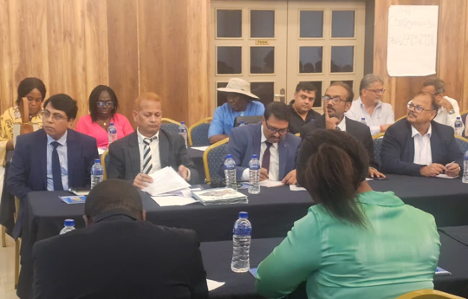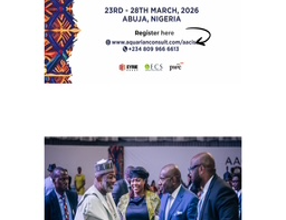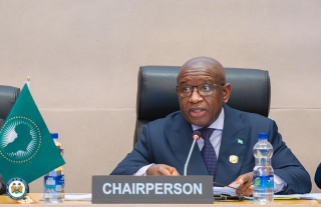India and Sierra Leone Strengthen Ties Through Roundtable on Aquaculture and Fisheries

The High Commission of India in Freetown, on Monday, 6th October 2025, hosted the India–Sierra Leone Roundtable on Aquaculture and Fisheries at the Country Lodge Hotel, Hill Station. The forum aimed to deepen bilateral cooperation, enhance knowledge sharing, and explore sustainable strategies to advance Sierra Leone’s aquaculture and fisheries sector.
The event brought together key stakeholders from both nations, including government officials, scientists, entrepreneurs, and representatives of international organizations. Discussions centered on developing a framework for technology transfer, capacity building, and private-sector partnerships to strengthen Sierra Leone’s blue economy.
In his opening remarks, India’s High Commissioner to Sierra Leone, B.C. Pradhan, noted that the roundtable was the result of over six months of collaboration with Sierra Leone’s Ministry of Fisheries and Marine Resources. He said the engagement followed earlier partnerships involving the Indian Council of Agricultural Research (ICAR) and organizations such as World Peace.
Highlighting India’s transformation in food production and aquaculture since independence, Pradhan reflected on the country’s journey from famine to becoming a global agricultural leader. Today, India ranks second worldwide in aquaculture production and leads in several other agricultural categories, including milk, food grains, fruits, and vegetables.
He expressed India’s readiness to share its experience and scientific expertise with Sierra Leone, particularly in training, research, and institutional collaboration. “Capacity building remains central to our cooperation,” Pradhan said, citing the Indian Technical and Economic Cooperation (ITEC) program, which provides training opportunities for government professionals and scientists in India.
The High Commissioner revealed that 37 Sierra Leonean students are currently studying at top Indian universities on fully funded scholarships covering tuition, airfare, accommodation, and stipends. He pledged that additional scholarships would be made available next year, reinforcing India’s commitment to human capital development.
Pradhan emphasized the vast potential of aquaculture to complement Sierra Leone’s marine fisheries, noting that while marine resources are finite, aquaculture offers scalable and sustainable opportunities for employment, food security, and economic growth. He added that such development aligns with Sierra Leone’s Feed Salone agenda and the Big Five Game Changers, promising “low-cost, high-impact gains for livelihoods and nutrition.”
Princess Dugba, Sierra Leone’s Minister of Fisheries and Marine Resources, welcomed the partnership and reaffirmed her ministry’s commitment to building a resilient and sustainable aquaculture sector. She said Sierra Leone stands to benefit greatly from India’s vast experience in freshwater and marine aquaculture.
The Minister highlighted that Sierra Leone’s marine fisheries currently hold an estimated 450,000 metric tons of fish, with a maximum sustainable yield of about 250,000 metric tons per year—a decline from approximately 500,000 metric tons recorded five decades ago. She stressed that expanding aquaculture is therefore critical to maintaining long-term fish production and preserving marine ecosystems.
While current revenues from the fisheries sector range between $6.5 million and $10 million annually, Dugba noted that the sector has the potential to generate over $59 million if properly managed and supported by modern aquaculture practices.
She outlined government priorities, including the promotion of freshwater aquaculture in inland valley swamps and the development of mariculture, focusing on oysters, shrimp, seaweed, and commercial marine fish species. She noted that seaweed could be processed into fertilizer, while oysters and shrimp could serve export markets.
The Minister encouraged Indian private-sector investors to engage in joint fish-farming projects and value-added processing, including investments in ice-making machines and blast freezers at fish harbors to strengthen the fisheries value chain.
Dr. Joykrushna Jena, representing the Indian Council of Agricultural Research (ICAR), said the delegation’s mission was to understand Sierra Leone’s aquaculture landscape and identify opportunities for collaboration. He noted that globally, aquaculture has surpassed capture fisheries in production, with India producing about 19.5 million tons of fish annually, growing consistently at 6–10% for several decades.
Jena attributed India’s success to robust research, advanced breeding technologies, and strong private-sector engagement, adding that the country’s current focus also includes food safety, gender inclusion, and environmental sustainability. He highlighted that India operates 113 research institutes, 731 Farm Science Centers, and 78 agricultural universities, including 30 specialized centers for fisheries and aquaculture.
He assured participants that India’s expertise in technology, training, and innovation could be adapted to Sierra Leone’s context, helping the country build a modern, inclusive, and profitable aquaculture industry.
Sheku Sei, Director at Sierra Leone’s Ministry of Fisheries and Marine Resources, provided an overview of the nation’s fisheries landscape. He described Sierra Leone’s 570-kilometer coastline and 30,000 km² continental shelf as rich in biodiversity, hosting over 200 marine species. However, he noted that inland aquaculture remains limited to catfish and tilapia.
Sei identified major opportunities in expanding inland aquaculture and mariculture, particularly oyster and shrimp farming, citing successful pilot projects in mangrove areas. He added that both smallholder fish farming and large-scale catfish operations have proven economically viable and could generate millions in revenue with proper investment and technology transfer.
He concluded that aquaculture could become a cornerstone of Sierra Leone’s economic diversification, providing jobs for women and youth while protecting marine biodiversity. “With Indian expertise and investment in technology, inputs, and training, we can accelerate sustainable aquaculture growth, protect our marine environment, and enhance food security,” he said.
The India–Sierra Leone Roundtable on Aquaculture and Fisheries marked a significant step in strengthening cooperation between the two nations. Both sides agreed to deepen collaboration in research, training, and private investment—laying the foundation for a vibrant aquaculture ecosystem capable of transforming Sierra Leone’s fisheries sector and contributing meaningfully to national development.





